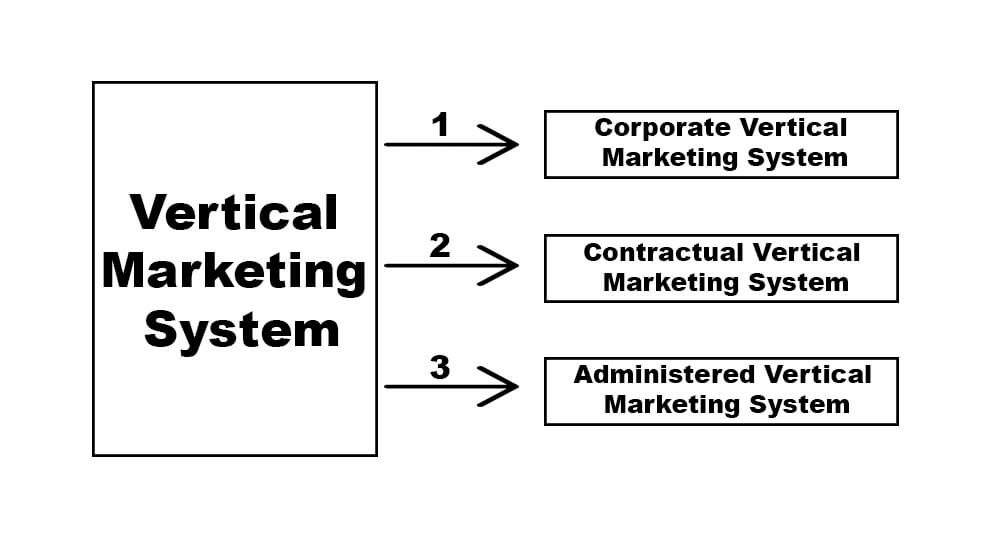A marketing system can be vertical or horizontal. Businesses can use either to market and sell their products. A vertical marketing system (VMS) is when manufacturers, wholesalers, and retailers work together. This system helps reduce costs, improve efficiency, and increase sales.
A horizontal marketing system occurs when two or more companies at the same level join forces. This helps them share resources, expand their reach, and increase their profits.
Today’s blog post will discuss vertical marketing systems, their types, and examples.
Let’s get started.
What is a Vertical Marketing System?
A Vertical Marketing System (VMS) includes all parts of the supply chain, such as the producer, wholesaler, and retailer. These parts work together to serve the customer.
The key characteristic of VMS is close integration among all partners. This means they share goals, resources, and decision-making. VMS helps businesses reduce costs, improve efficiency, and increase sales.
Many big brands, like Apple and McDonald’s, use VMS to manage their supply chains. This system ensures smooth operations and better customer service.
Importance of a Vertical Marketing System
In a traditional marketing system, manufacturers, wholesalers, and retailers operate separately, leading to wasted resources, inefficiencies, and conflicts. Each component works independently, which can result in delays, higher costs, and inconsistent product availability.
To overcome these challenges, businesses adopted the Vertical Marketing System (VMS), where all components of the supply chain work together as a unified system. This approach allows businesses to streamline operations, eliminate unnecessary steps, and focus on their core functions. By integrating their processes, companies can reduce inefficiencies and create a more structured and profitable system.
Three Types of Vertical Marketing Systems

A Vertical Marketing System integrates manufacturers, wholesalers, and retailers into a unified system to streamline operations and improve efficiency. There are three main types of VMS:
1. Corporate Vertical Marketing System
In a corporate vertical marketing system, a single organization controls all aspects of the supply chain, from production to distribution and retail. This ensures greater quality control, cost savings, and consistent branding.
How It Works: The company manufactures its products, distributes them, and sells them through its own branded stores.
Examples: Apple, Amway, and Firestone
These companies produce their own products and sell them exclusively through their own retail stores, eliminating third-party intermediaries.
2. Contractual Vertical Marketing System
In a contractual vertical marketing system, independent businesses work together as an integrated system under formal agreements. Each entity retains ownership but collaborates under legally binding contracts to ensure smooth operations.
How It Works: Companies sign contracts with distributors, suppliers, or franchisees to handle production, distribution, and sales while maintaining their brand identity.
Examples: Pepsi, Coca-Cola, and McDonald’s
Pepsi and Coca-Cola partner with independent bottlers and distributors, while McDonald’s franchises its restaurants to independent owners who follow corporate guidelines.
3. Administered Vertical Marketing System
An administered vertical marketing system operates without a single ownership or contractual agreement. Instead, a dominant company, due to its market power and influence, controls the entire system.
How It Works: Smaller businesses follow the leader’s rules to gain access to its vast customer base, ensuring mutual benefit.
Example: Amazon
Amazon works with numerous third-party vendors, suppliers, and delivery services. While these partners remain independent, they must comply with Amazon’s strict policies to continue doing business on the platform.
Advantages and Drawbacks of a Vertical Marketing System
Advantages of a VMS
- Better Coordination & Efficiency: Since all supply chain components work together, processes become smoother, reducing delays and inefficiencies.
- Lower Costs: By eliminating unnecessary middlemen, businesses save on distribution and operational expenses.
- Stronger Brand Control: Companies can maintain consistency in pricing, marketing, and customer experience.
- Higher Profit Margins: Direct control over supply chain activities helps businesses maximize their earnings.
- Reduced Conflicts: Since all entities work towards a common goal, there is less friction between manufacturers, wholesalers, and retailers.
Drawbacks of a VMS
- High Initial Investment: Setting up an integrated system requires significant financial resources.
- Complex Management: Managing all components under one system can be challenging, requiring expertise and coordination.
- Limited Flexibility: Businesses may find it difficult to adapt quickly to market changes due to their structured system.
- Risk of Dependence: If one component faces issues (e.g., supply chain disruptions), the entire system can suffer.
- Potential for Monopoly-like Control: In administered VMS, a dominant company may exert too much influence over smaller businesses.
Summary
In a Vertical Marketing System, manufacturers, distributors, and retailers collaborate as a unified group to meet consumer needs. Regardless of the VMS type, all components stay closely connected, ensuring better service and higher profits—something they couldn’t achieve by operating independently.
